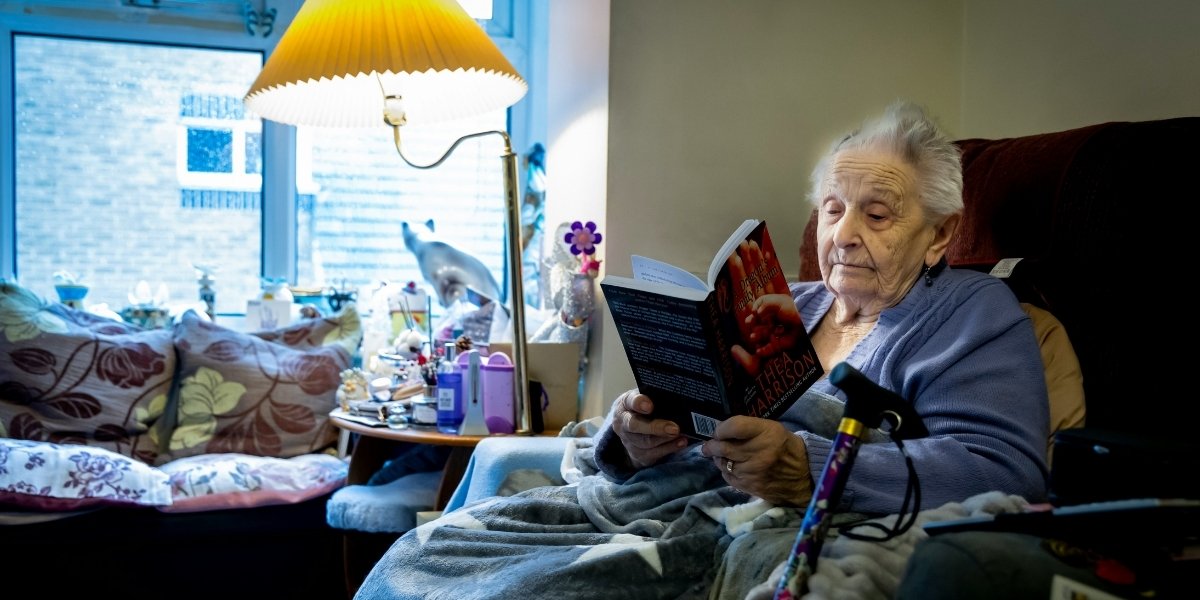By: Joshua Finley
In an era where advanced technology often feels out of reach for older adults, Eve Communications is making strides in cognitive health through an innovative, accessible approach to AI-driven communication. At the heart of the company is the Eve product, an artificial intelligence device designed to address the growing crisis of loneliness and cognitive decline among seniors, particularly those living with dementia. Unlike traditional AI devices, Eve takes the form of a familiar rotary phone—a design choice inspired by user feedback and aimed at ensuring ease of use and comfort for older individuals.
The story behind Eve is deeply personal for Ivan Wicksteed, the founder and CEO of Eve Communications. “I was inspired to create Eve by the death of my grandmother, who sadly took her own life at the age of 97. Like millions of other people, she was lonely and felt like she had nobody to talk to,” Wicksteed shared. This personal loss sparked the creation of Eve, a device that Wicksteed hopes will provide companionship, cognitive stimulation, and peace of mind to both seniors and their caregivers.
Bringing AI to Life Through Familiar Technology
One of the unique aspects of Eve is its design. While many AI devices today take the form of sleek, futuristic gadgets, Eve looks like a traditional rotary phone—a nostalgic nod to the past. Wicksteed explains that the decision to use this design came out of extensive user testing. “Most people over the age of 50 have very positive associations with this type of phone from growing up. It feels very natural—even for people who are intimidated by new technology,” he says.
Eve’s functionality is simple yet powerful. Users can simply plug her in and begin talking. There are no complicated instructions, making the device highly user-friendly, even for individuals with cognitive impairments. This ease of use is critical for the target demographic, especially as Eve’s capabilities extend beyond simple conversation.
AI Tailored for Cognitive Health
What sets Eve apart is her ability to engage in meaningful, personalized conversations. Eve’s AI can be programmed to use a voice familiar to the user, which can be particularly beneficial for dementia patients. “Every individual’s relationship with Eve is different depending on their cognitive state,” Wicksteed explains. Eve checks in on users daily, asking questions about how they are feeling and relaying that information to caregivers or family members via text. This feature offers an added layer of care, ensuring that caregivers stay informed even when they are not physically present.
Caregivers, in particular, have responded positively to Eve. One early beta tester shared that she had her first restful night’s sleep in a year, knowing that Eve was there to keep her mother company when she couldn’t be. “We often hear Eve described as ‘an extra pair of hands’ for people who can’t afford round-the-clock care,” Wicksteed says.
Addressing Cognitive Decline with Consistent Engagement
Eve plays an active role in combating cognitive decline, which often accelerates with age. Research shows that regular mental stimulation can help slow the progression of conditions like dementia. “The phrase ‘use it or lose it’ is one you hear a lot in neurology,” says Wicksteed. Eve engages users in daily conversations, providing cognitive exercises and prompts that challenge the brain to stay active. Though full-blown clinical trials are still in the early stages, Eve Communications has begun tracking health metrics such as anxiety, loneliness, and memory through industry-standard measures like the UCLA Loneliness Scale and GAD-5.
A Nostalgic Approach to Memory Care
One of the core principles behind Eve’s design is nostalgia. Wicksteed believes that nostalgia plays a powerful role in memory care, particularly for individuals with dementia. The familiar sound of a phone ringing and the physical motion of answering a call are deeply ingrained in long-term memory. This familiarity allows users to engage with Eve even in the later stages of dementia when other types of technology might feel foreign or intimidating.
Looking Ahead: The Future of AI in Cognitive Health
Eve Communications is just beginning to tap into the potential of AI in the healthcare space. Wicksteed sees a future where Eve’s technology could be expanded beyond dementia care to address other areas of cognitive health. “We’re exploring how Eve can be integrated into a broader healthcare ecosystem, providing support for a range of cognitive conditions,” he says.
As for partnerships, Eve Communications is in discussions with healthcare providers and senior care organizations to make Eve more widely available. With AI continuing to evolve, Wicksteed believes that Eve can help reshape how society approaches care for individuals with dementia and other cognitive conditions.
Eve’s potential goes beyond offering companionship—it represents a shift in how technology can be harnessed to improve the lives of some of society’s vulnerable individuals. Through a combination of advanced AI and a simple, nostalgic design, Eve is proving that technology doesn’t have to be intimidating to make a meaningful difference.
For more information on Eve Communications, visit their website at www.iameve.ai.
Disclaimer: The content in this article is intended for informational purposes only. It does not constitute professional medical advice, diagnosis, or treatment. Any health-related claims mentioned within are based on early-stage research and anecdotal evidence. Readers should consult qualified healthcare professionals before making any medical decisions or adopting new health technologies. The opinions and insights shared in this article are those of the author and do not represent any guarantees or endorsements of specific products or outcomes.
Published By: Aize Perez









